Brexit Brief Newsletter
21 December 2020

The transition period ends in 10 days and an agreement between the UK and EU has still not been reached. We take a look at the progress which has been made, and the events of the last week, including interventions by the European Parliament which could hamper plans for a deal’s ratification by the end of the year. The Internal Market Bill has received Royal Assent (without the controversial clauses), while Brexit-related disruption is already starting to be seen at ports.
A very narrow path to a deal
On Wednesday 16 December European Commission President Ursula von der Leyen addressed the European Parliament, giving an update on Brexit talks which she called “the unfinished business of this year”. She told MEPs she could not tell them whether there would be a deal, but that, “there is a path to an agreement now. The path may be very narrow but it is there”. She said that “a way forward” has been found on most issues but that the level playing field and fisheries were proving tougher matters to tackle. Progress has been made on state aid “based on common principles, guarantees of domestic enforcement, and the possibility to autonomously remedy the situation where needed”, and on standards a strong mechanism of non-regression has been agreed.
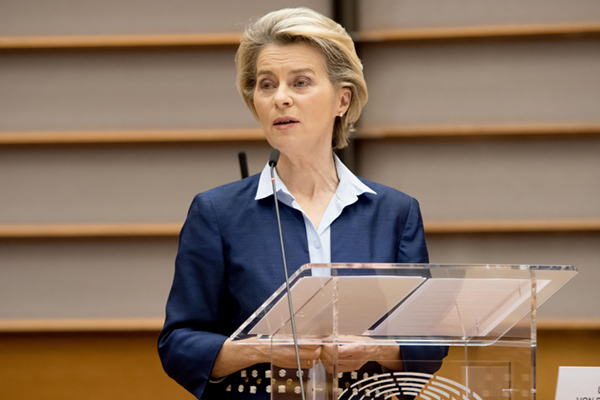
Ursula von der Leyen addresses the European Parliament. Source: EC - Audiovisual Service
Von der Leyen called the discussion on fisheries “very difficult”, stating that the EU is asking for “predictability and stability for [its] fishermen and fisherwomen”. She thanked the European Parliament for its understanding and support in the process. Sunday was supposed to be (another) crucial cut-off point: on Thursday the Parliament’s Conference of Presidents adopted a declaration stating it will not be rushed to ratify the Brexit deal before the end of the year, if it does not have access to the text by midnight on Sunday (yesterday). The statement noted that the Commission will always propose that “provisional application of trade agreements take place only once the European Parliament has given its consent”. One senior MEP declared on Sunday that the Parliament is now not in a position to scrutinise a deal by the end of the transition period so no-deal preparations should be made, and emergency measures agreed with the UK.
UK Prime Minister Boris Johnson spoke with Von der Leyen on Thursday evening to take stock of the negotiations. Von der Leyen stated that “big differences remain to be bridged…[which] will be very challenging”. According to the UK statement, the Prime Minister “underlined that the negotiations were now in a serious situation…and it now looked very likely that agreement would not be reached unless the EU position changed substantially.”
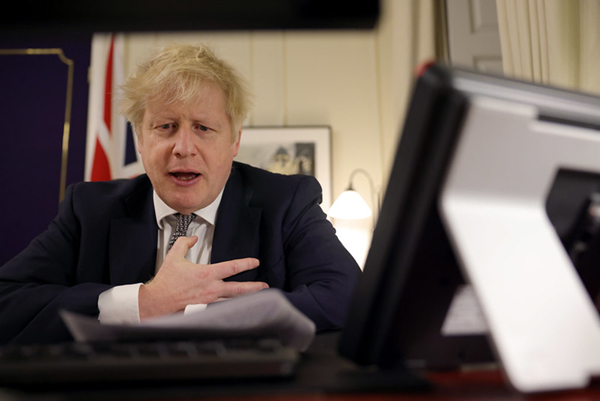
Boris Johnson speaks with Ursula von der Leyen. Source: Pippa Fowles / No 10 Downing Street
On Friday EU Chief Negotiator Michel Barnier addressed the European Parliament. He said, “It was the British who set this very short deadline to which we are now forced,” by refusing any extension of the transition period. Barnier stated that it would be “neither fair nor acceptable for European fishermen to have only transitional rights in UK waters, which one day evaporated, while everything else in the deal – especially for UK companies – would remain stable. It would not be fair or just.”
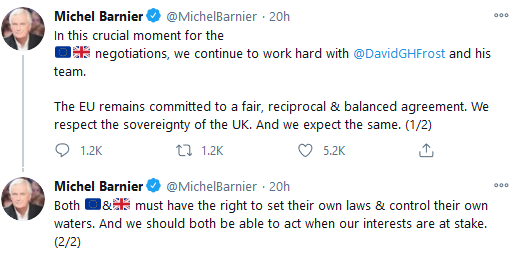
@MichelBarnier on Twitter
Barnier has been holding meetings with senior officials from the eight European costal states. Under discussion is the catch quota for EU boats in UK waters, and the length of a phase-in period as proposed by the EU, which could be tied to the UK’s continued access to the EU single market.
Joint Committee confirms agreement on Ireland/Northern Ireland Protocol
The Joint Committee, which oversees the implementation of the Withdrawal Agreement and Protocol on Ireland/Northern Ireland, met virtually on Thursday to finalise the agreement announced the week previously by co-chairs Chancellor of the Duchy of Lancaster Michael Gove and European Commission Vice-President Maroš Šefčovič.
The UK Government said the decisions “demonstrate the UK’s and the EU’s commitment to the implementation of the Protocol in full.” Šefčovič stated that it marked an “important milestone” and thanked Gove for his “personal dedication and solution-driven approach”. He said the agreement now provides businesses and people in Northern Ireland with clarity and stability. The co-Chairs have agreed that the Committee will continue to meet at least quarterly over the next year.
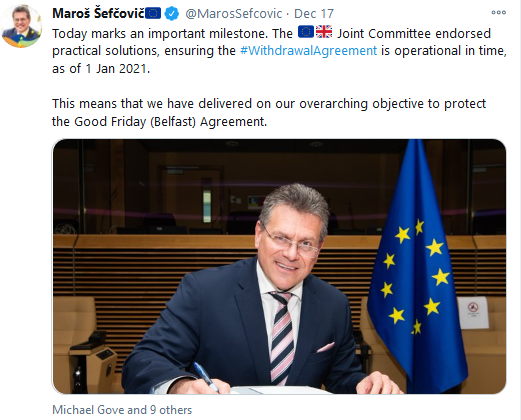
@MarosSefcovic on Twitter
This UK Government website contains information for UK businesses on moving goods into and out of Northern Ireland from 1 January 2021. This includes details of the Movement Assistance Scheme which will give financial assistance to businesses to help with the extra requirements for moving animals and plant products, such as Export Health Certificates. The UK Trader Scheme will help businesses moving goods GB-NI and will help ensure they don’t pay tariffs on goods remaining in the UK customs territory. The website contains further information about Customs, VAT, excise, regulations around goods, including ‘at risk’ goods, agri-food regulations, as well as environmental standards and medicines.
The Europe Direct Contact Centre has a Brexit helpline for citizens and businesses. The helpline is available in the 24 EU languages and questions relating to the UK will be treated as priority. The Contact Centre can also be accessed from the UK at 00 800 6789 1011 and online .
Agriculture Minister on Brexit readiness
The Committee for Agriculture, Environment and Rural Affairs heard evidence last week from Minister Edwin Poots. The Minister for Agriculture, Environment and Rural Affairs welcomed the three-month grace period agreed in the Joint Committee but said he would have liked to have seen a “more substantive solution”. He told the Committee that a solution has not been delivered for the movement of breeding animals from GB to NI which would “decimate traditional trading practices between ourselves and GB.”
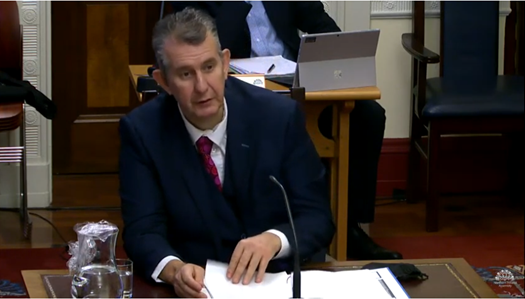
Minister Poots speaking to the Committee for Agriculture, Environment and Rural Affairs Source: NI Assembly
Regarding contingency arrangements for ports, there are preparations in place for three types of checks: 100% of documentary checks will be done remotely, identity checks would be carried out in GB ports, and there would be physical checks on a percentage of freight vehicles. Officials said that they will have the basic physical structures in place to deal with this, and the NI chief veterinary officer said he wanted to see “sensitive, pragmatic and sensible” enforcement of the regulations. There has been some uncertainty about whether the grace period agreed in the Joint Committee would apply to all traders. Poots stated it is for wider retailers of food and would probably apply to 14 or 15 companies. The Department is operating a major emergency response plan and is meeting in the mornings six days a week.
Internal Market Bill and Taxation (Post-transition Period) Bill
The Internal Market Bill received Royal Assent on 17 December. The Scottish Parliament and Senedd Cymru both withheld their consent for the Bill, while a motion for legislative consent was not laid in the NI Assembly. A UK Government Minister told the Commons that the “exceptional circumstances” of the UK’s departure from the EU and the need for a “UK-wide legal underpinning for the internal market” is a situation where the UK Parliament might need to legislate in such a way, as envisaged by the Sewel Convention. The Taxation (Post-transition Period) Bill also received Royal Assent on 17 December.
Meanwhile the Lords Common Frameworks Scrutiny Committee has written to Minister Chloe Smith, stating that “the introduction of the Internal Market Bill has had a detrimental impact on the development of the frameworks programme”. The Committee Chair writes that “in many cases the frameworks were clearly drafted without proper understanding of the Bill and it has created uncertainty about how the frameworks will operate in practice.” She goes on to state that “the market access principles in the Internal Market Bill also undercut the frameworks process.” The Committee has asked for a number of changes to be made to ensure Parliament has enough information to effectively scrutinise the frameworks following the end of the transition period.
Preparing for the end of the Transition period
The House of Commons Committee on the Future Relationship with the European Union has published its third report, entitled “preparing for the end of the transition period”. The report states “the citizens of Northern Ireland deserved to know far sooner the terms of trade within their own country” and that even with the pragmatic solution the EU and UK have reached, the early months under the Protocol are “likely to be difficult”. GB businesses and hauliers which move goods to NI will be affected, as will ports such as Holyhead and Cairnryan – the report states that the UK Government should work to put in place contingency measures to minimise disruption close to these sites. An increase in freight traffic has already been seen at ports in the UK such as Holyhead: this is partly due to companies stockpiling at the end of the transition period, as well as the expected increase in flow of goods which occurs at this time of the year. Regarding security cooperation, the report argues that the UK must explore all avenues available, including bilateral arrangements, to allow law enforcement agencies in NI and Ireland to continue their close cooperation and sharing of information and intelligence.
Government announces further funding for Northern Ireland
Secretary of State for Northern Ireland announced a further £200 million in additional funding for Northern Ireland as part of the Peace Plus programme. The EU PEACE programmes have been running since 1995 as a cross-border initiative to promote economic and social stability, and cohesion between communities in Northern Ireland. In the Withdrawal Agreement the UK and EU committed to funding for the PEACE+ programme.
Parcel disruption
Amazon has told customers that Brexit may bring changes to ordering and delivery of items sold by amazon.co.uk, “due to additional requirements by UK customs authorities for deliveries to Northern Ireland”. This could mean delays to delivery, or lack of availability. The BBC reports that other online retailers such as Zalando and Hugo Boss are temporarily suspending delivery to NI as they adapt to the new regime from 1 January. The delivery firm DPD is also temporarily suspending its services for GB to NI and GB to Ireland parcels.
Catch up with the Committees
- Tuesday 15 December, 10.30 am – Plenary - Committee for the Executive Office motion - Report on the evidence received from local councils on the impact of the United Kingdom's exit from the European Union
- Wednesday 16 December, 9am - Committee for Infrastructure - Secondary legislation and Common Frameworks– briefing from Department officials
- Wednesday 16 December, 10am - Committee for the Economy - Consideration of EU Exit legislation
- Wednesday 16 December, 2 pm - Committee for Finance - Public Procurement Common Framework
- Wednesday 16 December, 2 pm - Committee for the Executive Office - Oral evidence session with Departmental officials on Brexit; Article 2 of the Protocol on Ireland/Northern Ireland - Joint Committee of Northern Ireland Human Rights Commission and the Irish Human Rights and Equality Commission and the Equality Commission for Northern Ireland
- Thursday 17 December, 9 am - Committee for Health - Departmental Briefing on Brexit; EU Exit Secondary legislation
- Thursday 17 December, 9.15 am - Committee for Agriculture, Environment and Rural Affairs - Oral Evidence from DAERA - EU Exit Preparedness and Priorities for 2021; EU Exit Secondary legislation – written briefings from DAERA; Common Framework for Plant Varieties and Seeds; Common Framework for Fertilisers; Written Briefing DAERA on EU Exit Preparation and Delivery



